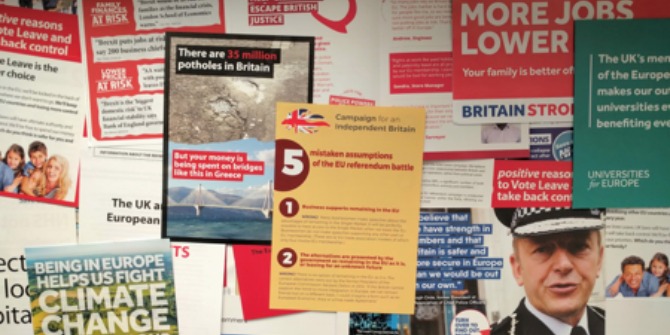 Aware of the need to be a valuable REF contributor to his department, but equally focused on the importance of improving the economic literacy of young people, Danny Quah discusses his experience delivering the LSE’s Big Questions Lecture.
Aware of the need to be a valuable REF contributor to his department, but equally focused on the importance of improving the economic literacy of young people, Danny Quah discusses his experience delivering the LSE’s Big Questions Lecture.
In June 2011, I was lucky enough to deliver the inaugural LSE Big Questions Lecture. Targeted to reach 14 year-old school children in London’s schools, I chose to speak on whether the East was taking over the world as I felt these global changes matter to everyone, and they are developments with important economic ideas surrounding them. Hundreds of young students turned showed up on the day, and the lecture itself was televised for subsequent broadcast. The run-up to this lecture involved months of planning and rehearsal, writing and rewriting, arguing and disagreeing – on analytical content and ideas, on what 14 year-olds might find useful, understandable and memorable, on the best ways to communicate different ideas in economics and facts about the world.
[jwplayer mediaid=”5026″]
Why did we do this?
As an academic economist, I study growth and distribution. I write about the shifting global economy and the rise of the East. I try to make large things visible to the human eye. I want to be considered a valuable REF contributor to my department and to the LSE. But I also believe that these are times where economic literacy matters hugely, not least in societies that continue to hold to the ideals of liberal democracies. And there are intriguing large-scale parallels between important events now and those some time ago in history.
 In 1825 Michael Faraday — perhaps the world’s greatest ever experimental scientist — initiated (but did not himself give) the first of the Royal Institution of Great Britain’s Christmas Lectures. Faraday went on to deliver 19 series altogether of these annual lectures, his last in 1860, presenting and explaining to the British public ongoing discoveries in chemistry and electricity and magnetism.
In 1825 Michael Faraday — perhaps the world’s greatest ever experimental scientist — initiated (but did not himself give) the first of the Royal Institution of Great Britain’s Christmas Lectures. Faraday went on to deliver 19 series altogether of these annual lectures, his last in 1860, presenting and explaining to the British public ongoing discoveries in chemistry and electricity and magnetism.
The Royal Institution Christmas Lectures have continued to the present day, interrupted only by World War 2. They are delivered to a general audience, notably including young people, with the aim to inform and entertain, and have proved highly popular despite the limited nature of early 19th century organised education. Since 1966 they have been televised and, for many British households, constitute a highlight of annual holiday family viewing. The energy and the ingenuity that go into the lectures are impressive, not least when, say, someone like Marcus du Sautoy, in his 2006 lectures, explains abstract number theory to a teenage audience.
These Royal Institution Christmas lectures provide the strongest counter-example I know to the conceit that research ideas are too difficult to explain to and too abstruse to excite the general public. Most of us just don’t work hard enough at it. So taking on something like the LSE Big Questions Lecture would be a challenge. But there was more.
In 1825, London had just become the world’s leading city by overtaking Beijing — vividly demonstrating the steady ongoing shift then of the world’s economic centre east to west. That year, the first modern economic crisis in history occurred — modern in the sense of not been caused by a war. The stock market crash of 1825 took out six London banks and sixty country banks in England alone, with the badly over-extended Bank of England having to be rescued by an injection of gold from France. For students of central banking, this event became enshrined afterwards in Walter Bagehot’s Lombard Street principles for the lender-of-last-resort role in central banking.
In 1825, Faraday’s scientific discoveries were not centre-stage for the Industrial Revolution swirling about him at the time. That first Industrial Revolution — perhaps the most important event in the history of humanity — was driven by iron-making, mechanisation, and steam power, more than by electrification and chemical processing. But chemistry and electricity and magnetism — where Faraday’s contributions were manifold and central — pointed to the then-future. These would go on to provide the more enduring engine of growth for modern economic progress, not least down to what today still powers all digital technologies, significant among them cellphones and the Internet.
The Royal Institution Christmas Lectures matter in British science for providing public knowledge into the most important exciting intellectual developments of the time. They gave the British public insight into what was new. Historians who study why a 14th-century Chinese Industrial Revolution did not occur, despite China’s more advanced science centuries prior to that in 1780 Britain, point to how science in England had always immediately connected to commercial application and public interest. This is exactly the same kind of connection that the Royal Institution Christmas Lectures make. By contrast, in China, science and technology were tightly controlled by a scholarly elite, who saw no reason to disseminate their discoveries. During the 18th-century Industrial Revolution, James Watt and Matthew Boulton had announced the English public “steam-mad”, whereas in Sung Dynasty China, time itself was considered the sole property of the Emperor.
I am under no mad illusion that what I do as an academic is even remotely comparable to the achievements by these giants of scientific and technical progress from 1825. But I don’t think I’m half-bad as a lecturer. I don’t shuffle my lecture notes and lose my place in them [I don’t use lecture notes]. I don’t mumble into my beard so that the audience has no idea what I just said [I’m ethnic Chinese and we don’t grow beards easily]. I don’t put up Powerpoint slides crammed full with text and then just read them out word-for-word [almost all my slides are just colourful pictures]. I’m passionate about explaining ideas in economic policy to any audience that might remotely be able to influence our national and global conversations on improving the state of the world.
Danny Quah’s LSE Big Questions Lecture, Is the East Taking Over the World, is available to watch online here. This post, and others, are available to read on Danny Quah’s personal blog.







